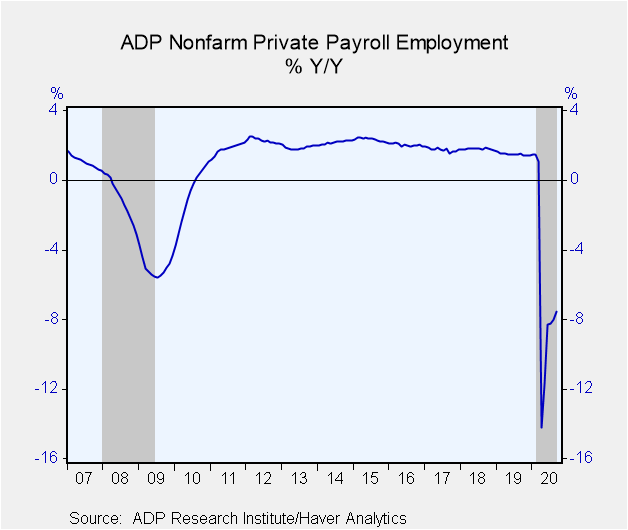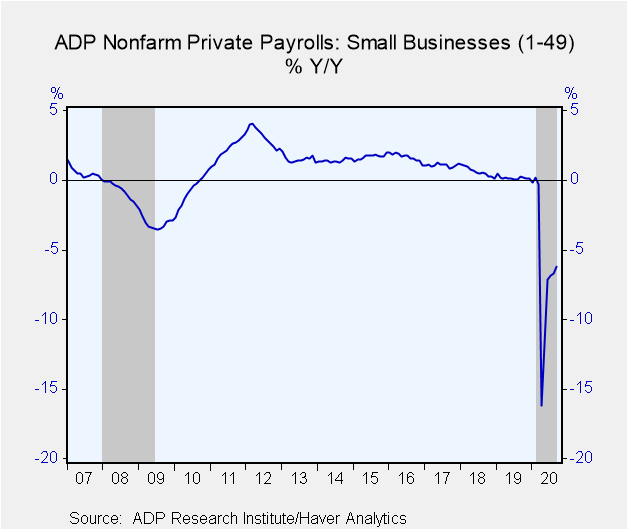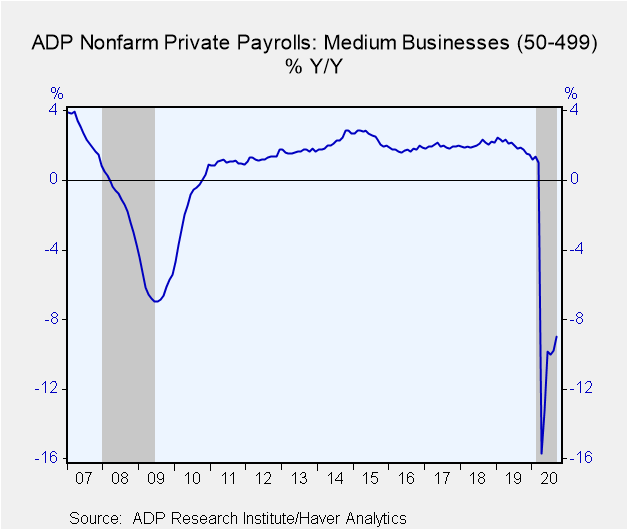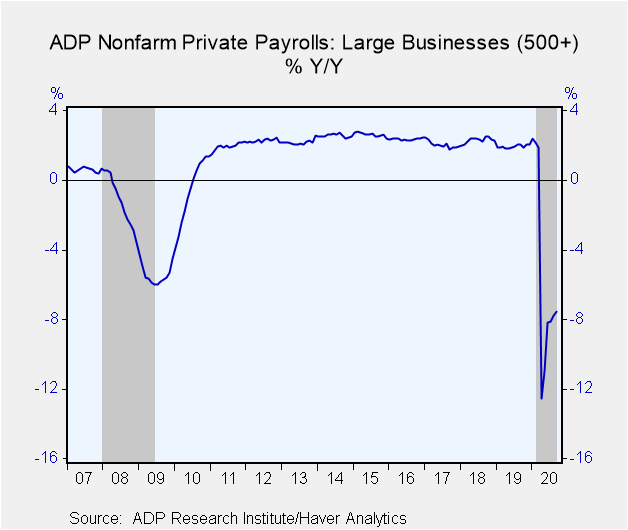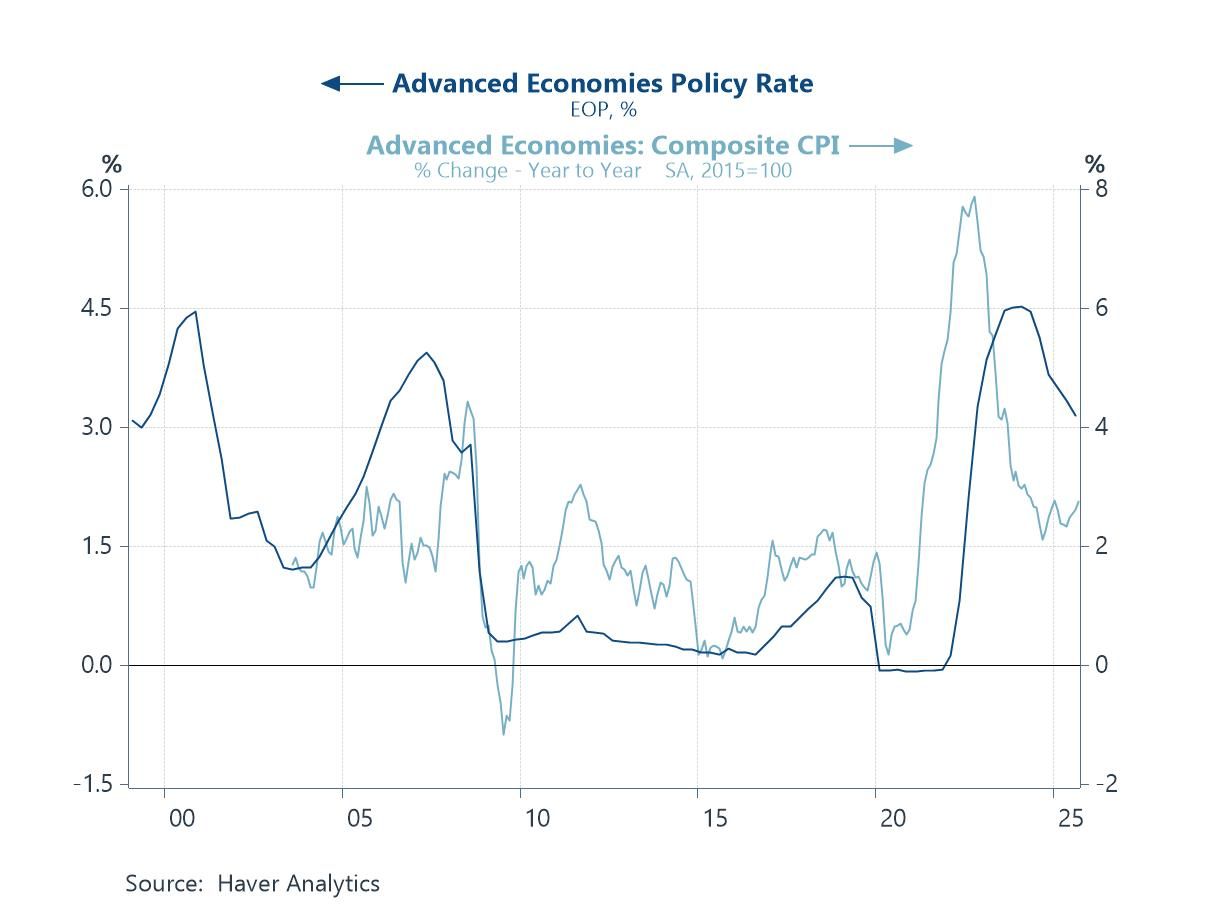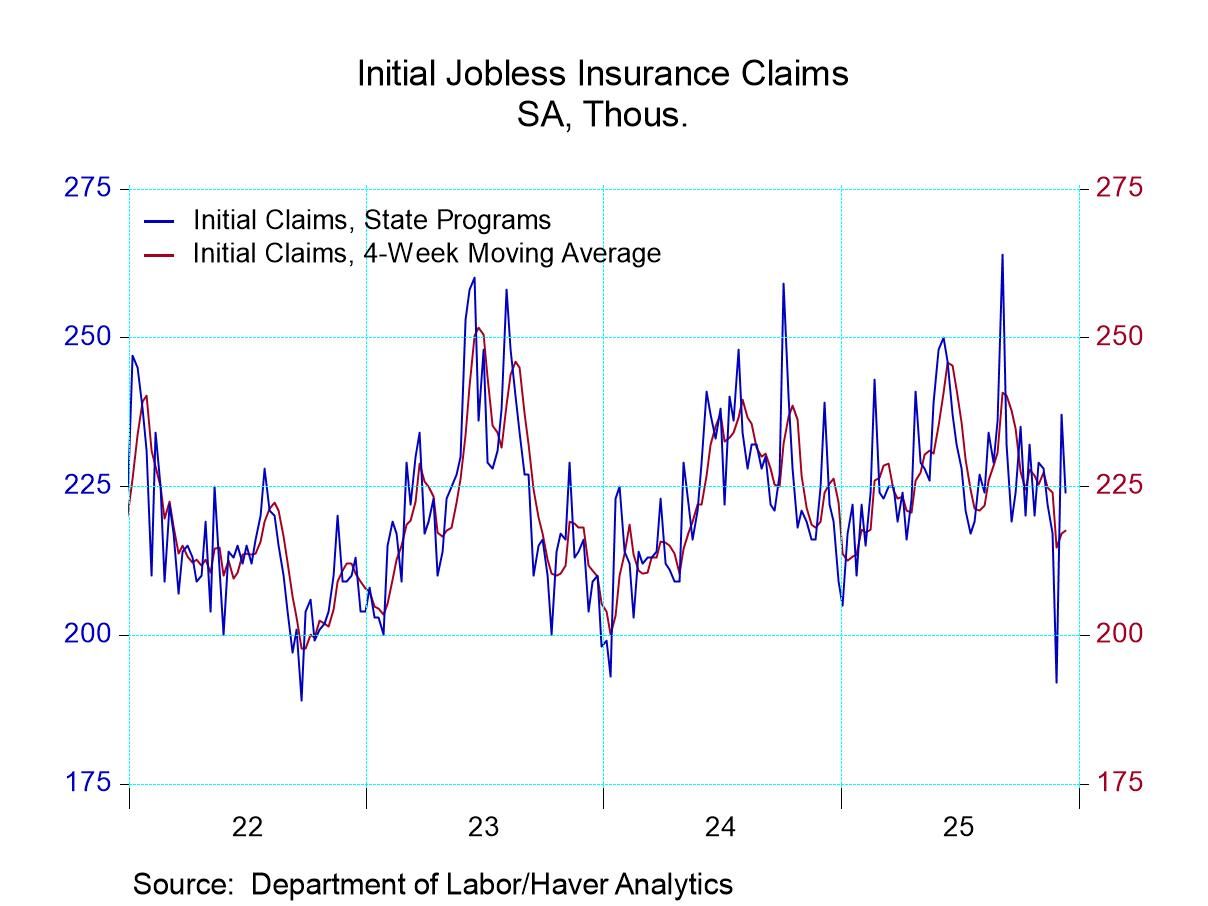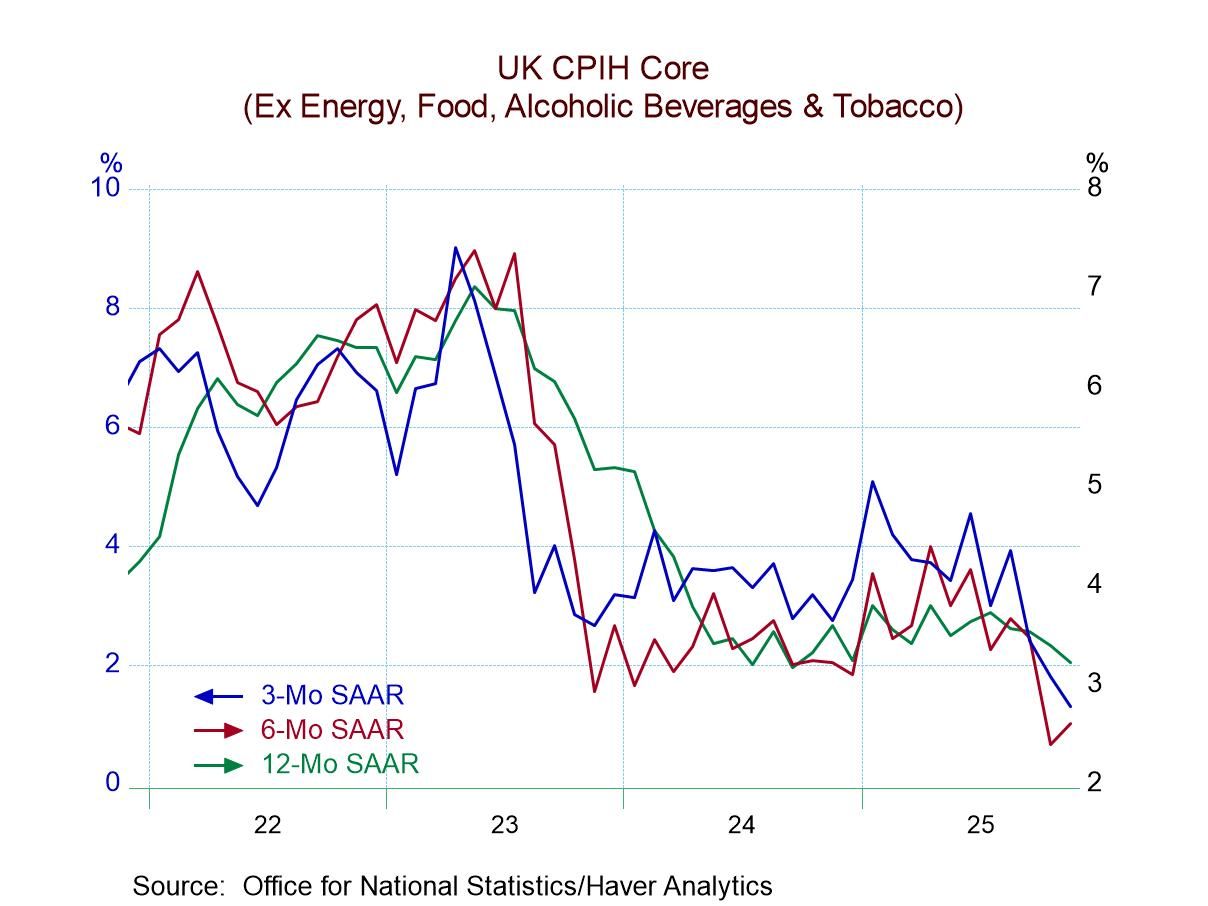 Global| Sep 30 2020
Global| Sep 30 2020U.S. ADP Nonfarm Private Payrolls Firm in September
by:Tom Moeller
|in:Economy in Brief
Summary
• Small-sized & medium-sized payroll growth improves. • Employment gain exceeds expectations. Job market improvement is ongoing. The ADP National Employment Report indicated that nonfarm private payrolls increased 749,000 (-7.5% y/y) [...]
• Small-sized & medium-sized payroll growth improves.
• Employment gain exceeds expectations.
Job market improvement is ongoing. The ADP National Employment Report indicated that nonfarm private payrolls increased 749,000 (-7.5% y/y) following a 481,000 August gain, revised from 428,000. That came after a 216,000 July improvement, revised from 212,000. The latest figure compared to a 590,000 increase expected in the Action Economics Forecast Survey. The ADP report is based on survey data through September 12.
Large payrolls increased 297,000 (-7.5% y/y) following a 341,000 August gain, revised from 298,000. Medium-sized payrolls strengthened 259,000 (-9.0% y/y) after an 83,000 August increase, revised from 79,000. Small-sized payrolls rose 192,000 (-6.2% y/y) during September after improving 57,000 during August, revised from 52,000.
Within industry sectors, employment amongst goods-producing firms jumped 196,000 (-4.1% y/y) after increasing 46,000 in August, revised from 40,000. The size of construction sector payrolls rose 60,000 (-1.8% y/y) after gaining 26,000 in August, revised from 28,000. Factory sector employment strengthened 130,000 (-4.9% y/y) after a 19,000 August rise, revised from 9,000. It was the largest increase in three months. Employment in the natural resource & mining sector edged 7,000 higher (-12.5% y/y), up for the second straight month.
Employment in the private service sector rose 552,000 last month (-8.2% y/y) following a 435,000 August rise, revised from 359,000. Trade, transportation & utilities jobs led the increase, surging 186,000 (-5.4% y/y) after rising 68,000 in August, revised from 58,000. A 92,000 rise (-24.1% y/y) in leisure & hospitality employment followed with a little-revised 128,000 improvement. The number of education & health services jobs rose 90,000 (-4.4% y/y) after improving 102,000 in August, revised from 100,000. A 78,000 gain (-6.2% y/y) in the number of professional business services jobs came after a 96,000 rise, revised from 66,000. Jobs in financial services rose 29,000 (-1.3% y/y) after improving a little-changed 12,000. Information sector payrolls improved 17,000 (-10.4% y/y), the first material increase since 2016.
The Automatic Data Processing Research Institute survey covers 411,000 companies and includes about one-fifth of U.S. private payroll employment. The data are processed by Moody's Analytics Inc., then calibrated and aligned with the BLS establishment survey data. The ADP data cover private sector employment only.
The ADP National Employment Report data can be found in Haver's USECON database. Historical figures date back to 2001 for private employment and the industry breakdown, and 2005 for the business size breakout. The expectation figure is available in Haver's AS1REPNA database.
Economic Conditions and the Path of Monetary Policy from Robert S. Kaplan, President & CEO, Federal Reserve Bank of Dallas is available here.
| ADP/Moody's National Employment Report | Sep | Aug | Jul | Sep Y/Y | 2019 | 2018 | 2017 |
|---|---|---|---|---|---|---|---|
| Nonfarm Private Payroll Employment (m/m chg, 000s) | 749 | 481 | 216 | -7.5% | 1.5% | 1.8% | 1.7% |
| Small Payroll (1-49) | 192 | 57 | 73 | -6.2 | 0.2 | 0.6 | 1.1 |
| Medium Payroll (50-499) | 259 | 83 | -16 | -9.0 | 2.0 | 2.0 | 1.9 |
| Large Payroll (>500) | 297 | 341 | 158 | -7.5 | 1.9 | 2.3 | 2.0 |
| Goods-Producing | 196 | 46 | 3 | -4.1 | 1.6 | 2.9 | 1.8 |
| Construction | 60 | 26 | -14 | -1.8 | 2.7 | 4.1 | 3.7 |
| Manufacturing | 130 | 19 | 18 | -4.9 | 1.0 | 1.9 | 0.8 |
| Service-Producing | 552 | 435 | 213 | -8.2 | 1.5 | 1.6 | 1.7 |
Tom Moeller
AuthorMore in Author Profile »Prior to joining Haver Analytics in 2000, Mr. Moeller worked as the Economist at Chancellor Capital Management from 1985 to 1999. There, he developed comprehensive economic forecasts and interpreted economic data for equity and fixed income portfolio managers. Also at Chancellor, Mr. Moeller worked as an equity analyst and was responsible for researching and rating companies in the economically sensitive automobile and housing industries for investment in Chancellor’s equity portfolio. Prior to joining Chancellor, Mr. Moeller was an Economist at Citibank from 1979 to 1984. He also analyzed pricing behavior in the metals industry for the Council on Wage and Price Stability in Washington, D.C. In 1999, Mr. Moeller received the award for most accurate forecast from the Forecasters' Club of New York. From 1990 to 1992 he was President of the New York Association for Business Economists. Mr. Moeller earned an M.B.A. in Finance from Fordham University, where he graduated in 1987. He holds a Bachelor of Arts in Economics from George Washington University.


